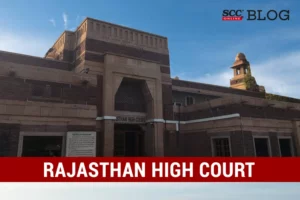Rajasthan High Court: In a case wherein the petitioners had invoked extraordinary jurisdiction of the Court under Article 226 of the Constitution to seek direction to the respondents to grant them notional increment for the services rendered by them and consequently refix their pensionary benefits, Anoop Kumar Dhand, J.*, held that the petitioners would be entitled to get notional payment on July 1, notwithstanding their superannuation on June 30, and further directed the respondents to consider the case afresh and grant notional increment to the petitioners.
Background
In the instant case, common questions of law were involved in all these writ petitions and each petition was grounded on the same facts. Consequently, with the parties’ mutual agreement, the Court addressed these matters together for final adjudication.
The grievance of the petitioners was that the respondents had declined them the benefit of notional increment on the ground that they retired one day before the increment was due. The petitioners contended that they had worked for the entire year with good conduct, and they stood retired on June 30 after attaining the age of superannuation and no departmental inquiry or judicial proceedings were pending against them; hence they were entitled to receive the annual increment.
The petitioners further contended that it would be arbitrary if the increment was denied only on the ground that they were not in employment on the day before and that the impugned action of the respondents offended the spirit of reasonableness enshrined under Article 14 of the Constitution.
The respondents submitted that the rule making authority had specified July 1 of the year for release of annual increment for all the employees and thus, this rule was reasonable and non-discriminatory.
Analysis, Law, and Decision
On considering the issue, whether the petitioners were entitled to receive the notional increment, the Court relied on Director, KPTCL v. C.P. Mundinamani, (‘C.P. Mundinamani case’), 2023 SCC OnLine SC 401 and All India Judges Association v. Union of India, (‘All India Judges Association case’), 2023 SCC OnLine SC 673, wherein it was held that a retired employee was entitled to get one annual increment which was earned by him on the last day of his service preceding one year from the date of retirement with good behaviour and efficiency.
The Court opined that “the grant of increment was not a matter of course and was dependent upon good conduct of the government servant for the entire year. It was, therefore, natural that good conduct must be observed for the entire year before the increment accrues. Where entitlement to receive a benefit crystallized in law its denial would be arbitrary unless it was for a valid reason”. The Court further opined that government servant was not holding the post on the day when the increment became payable could not be a valid ground for denying increment.
The Court opined that the scheme for payment of increment had to be read as whole and one part of Rule 14 of Civil Services (Revised Pay) Rules, 2008 and Rule 13 of the Rajasthan Civil Services (Revised Pay) Rules, 2017 respectively could not be read in isolation so as to frustrate the other part, particularly when the other part created right in the government servant to receive increment. This would ensure that the scheme of progressive appointment remained intact, and the rights earned by a government servant remained protected.
The Court observed that the issues involved in these petitions had been put to rest by the Supreme Court in C.P. Mundinamani case (supra) and All India Judges Association case (supra) and thus, the doctrine of finality had to be applied in a strict legal sense. Judicial propriety and decorum demand that the law laid down by the highest Court of the land must be given effect to. The Court further opined that the hallmark of a judicial pronouncement was its stability and finality. Thus, re-opening of the concluded judgments not only amounted to an abuse of the process of law and Court but also had far reaching adverse effect on the administration of justice.
Thus, the Court held that the petitioners would be entitled to get notional payment on July 1, notwithstanding their superannuation on 30th June. The Court further directed the respondents to consider the case of the petitioners afresh and thereafter grant notional increment to the petitioners. The Court further directed that the pension arrears had to be paid to the petitioners within three months from the date of receipt of a certified copy of the order.
Accordingly, the Court disposed of the petition.
[Vijay Singh v. State of Rajasthan, 2023 SCC OnLine Raj 1281, decided on 21-07-2023]
*Judgment by- Anoop Kumar Dhand
Advocates who appeared in this case:
For the petitioners: Sudhir Yadav, K.C. Sharma, Sandeep Saxena, Lokendra Singh Shekhawat, Samrath Sharma, Anand Sharma, Ravi Kant Agarwal, S.K. Saxena, Rahul Ghiya, Ram Pratap Saini, V.K. Gaur, C.P. Sharma, Jai Lodha, Hanuman Choudhary, Sandeep Sharma, Kamal Kant Sharma, Sonia Kumari, Vigyan Shah, Amit Singh Shekhawat, Shashwat Purohit, Parmeshwari Choudhary, Devendra Kumar Bhardwaj, Prahlad Singh, Sandeep Kalwaniya, Tanveer Ahamad, Mahesh Kumar Sharma, Damodar Prasad Pujari, Rajveer Sharma, Rajkumar Sharma, Ashwani Jangid, Ajay Choudhary, Mahendra Sharma, Atul Kumar Jain, R.D. Meena, Akhil Simolte, Nishant Sharma, Bhartesh Joshi, Saugath Roy, Akhilesh Kumar Saini, Santosh Singh Shekhawat, Dinesh Kumar Saini, Sumit Khandelwal, Sandeep Garssa, Krishan Kumar Sharma, Advocates;
For the respondents: R.P. Singh, AAG (Senior Advocate); C.L. Saini, AAG; Sheetal Mirdha, AAG; Rajesh Maharshi, AAG; S.S. Raghav, AAG; A.S. Rathore, Mananjay Rathore, Udit Sharma, Ms. Shretima Bagri, Advocates; Ganesh Parihar, AAG; Sameer Sharma, Vishnu Shanker Badaya, Hari Kishan Saini, Dy. G.C.; Rohit Choudhary, Dy. G.C.; Ajay Pratap Singh, Dy. G.C.; P.S. Naruka; Rupin Kala, GC; Parnitoo Jain, Akshay Sharma, AGC; Narendra Singh Yadav, RHB.

